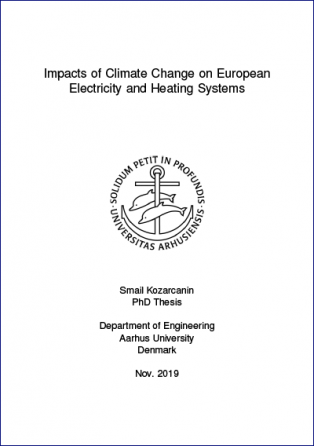Impacts of Climate Change on European Electricity and Heating Systems
Synopsis
The European Commission have developed a long-term energy strategy that, if successful, will result in net-zero greenhouse gas emissions in Europe. This may be achieved in part by designing future energy systems with a close link between the electricity and other end-use sectors. Such well-integrated systems take decades to engineer, which allows for additional climate change. Time is therefore a significant constraint and timely mitigation strategies are important. In this dissertation, I focus on the impact of climate change on future European electricity and heating systems and present a selection of my first-authored articles on this topic. Initially, I treat these sectors separately, but by the end, I focus on the potential benefits of designing a closely linked European electricity and heating system.
To represent a broad range of climate outcomes for the 21st Century, I adopt three representative climate projections from the Intergovernmental Panel on Climate Change. Based on the underlying assumptions of these projections, the World Climate Research Programme developed state-of-the-art weather data for the 21st Century that is made available for further research. I use weather data from nine independent climate models to generate climate change affected energy system data for this project. The large ensemble of data defines the foundation of this project and is used in all analyses.
The electricity sector is fundamental in the energy systems and with its rising share of renewable power production it becomes important to investigate into its resilience to climate change. In the article "21st Century Climate Change Impacts on Key Properties of a Large-Scale Renewable-Based Electricity System", I have shown that highly renewable electricity systems might perform equally well at the end of this century as of now. This is in particular an interesting result for coupling other end-use sectors with the power sector.
Measured data on space heating is not available on country scale, nor are highly granular estimates. To this end, I have developed a coherent method that can be used for this purpose. The method is presented in the paper "Estimating country-specific space heating threshold temperatures from national gas and electricity consumption data", and shows that current results can improve significantly by including weather and primary energy use.
In the paper "Impact of climate change on the cost optimal mix of decentralized heating in Europe", I uncover that the need for space heating may reduce significantly depending on the degree of climate change. With a careful modelling of the coefficient of performance, I show that heat pumps become more economically feasible with rising ambient temperatures.
I conclude this dissertation with an ongoing research, which shows that a closely linked power and heating system reduces the system cost by up to 10%. The impact of climate change and the CO2-constraints have a considerably higher impact, with system costs ranging from below 30% of the historical reference point to 90% above, depending on the projection.
Kapitler
-
Introduction
-
21st century climate change impacts on key properties of a large-scale renewable-based electricity system
-
Estimating country-specific space heating threshold temperatures from national consumption data
-
Impact of climate change on the cost-optimal mix of decentralised heat pump and gas boiler technologies in Europe
-
Techno-economic benefits of a fully coupled European electricity and heating system in a 21st century climate
-
General conclusion
-
Additional information: 21st century climate change impacts on key properties of a large-scale renewable-based electricity system
-
Additional information: Estimating country-specific space heating threshold temperatures from national consumption data
-
Additional Information: Impact of climate change on the cost-optimal mix of decentralised heat pump and gas boiler technologies in Europe
-
Project contributions

